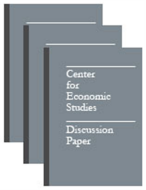The EITC and Intergenerational Mobility
The EITC and Intergenerational Mobility
Abstract
We study how the largest federal tax-based policy intended to promote work and increase incomes among the poor — the Earned Income Tax Credit (EITC) — affects the socioeconomic standing of children who grew up in households affected by the policy. Using the universe of tax filer records for children linked to their parents, matched with demographic and household information from the decennial Census and American Community Survey data, we exploit exogenous differences by children’s ages in the births and “aging out” of siblings to assess the effect of EITC generosity on child outcomes. We focus on assessing mobility in the child income distribution, conditional on the parents’ position in the parental income distribution. Our findings suggest significant and mostly positive effects of more generous EITC refunds on the next generation that vary substantially depending on the child’s household type (single-mother or married family) and by the child’s gender. All children except White children from single-mother households experience increases in cohort-specific income rank, own family income, and the probability of working at ages 25–26 in response to greater EITC generosity. Children from married households show a considerably stronger response on these measures than do children from single-mother households. Because of the concentration of family types within race groups, the more positive response among children from married households suggests the EITC might lead to higher within-generation racial income inequality. Finally, we examine how the impact of EITC generosity varies by the age at which children are exposed to higher benefits. These results suggest that children who first receive the more generous two-child treatment at later ages have a stronger positive response in terms of rank and family income than children exposed at younger ages.
Others in Series
Working Paper
Working Paper
Working Paper




